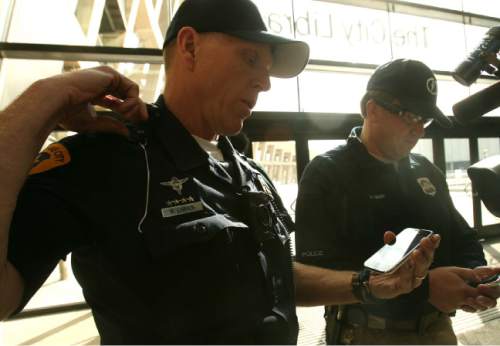This is an archived article that was published on sltrib.com in 2014, and information in the article may be outdated. It is provided only for personal research purposes and may not be reprinted.
West Valley City appears poised to outfit every police officer with body cameras.
The $1 million proposal would provide 175 cameras, making West Valley City the first police department in Utah to equip all of its officers, regardless of unit, said Chief Lee Russo.
"I think it's a great thing we're looking at here," said City Councilman Steve Buhler at a study session Tuesday.
After officers tested various models, Russo recommended a camera mounted to officers' glasses, allowing the camera to see roughly the same view as the officer regardless of what direction the officer is looking.
Body cameras have risen on the agendas of police agencies nationwide as controversial uses of force by officers have sparked protests and demands for more accountability.
But Russo said West Valley City's officers are themselves eager for the cameras, which "more often than not, re-affirm the officer" against civilian complaints.
He pointed to some research showing civilians also are less combative when they know their behavior is being filmed.
"We have to ... let the public know that, 'Smile you're on camera,'" Russo said. "The awareness of the public that we have the cameras, that they realize they're being video'ed, helps diffuse and de-escalate some of the problems we can encounter."
The Axon Flex cameras by Taser International can record 10 hours of video — an entire shift — and have 14 hours of battery life. Officers will be expected to turn them on at every encounter and keep them on, Russo said. In two recent fatal shootings, those of Darrien Hunt by Saratoga Springs police and Ty Worthington by South Jordan police, the shooting officers were wearing body cameras but did not turn them on.
Russo said he is consulting law enforcement professional groups and the ACLU of Utah to draft a policy for camera use. The ACLU has hailed the potential of body cameras to provide transparency in law enforcement but also cautioned against their potential invasiveness in people's homes.
"We want to make sure we understand everyone's needs and wants," Russo said.
The cameras will fill a hole in audio-visual technology left by the department's long-defunct dash cams in police cruisers. The car cameras have been out of operation since before Russo was appointed chief, more than a year ago.
"This is not the cure-all for police transparency and accountability, … but it will clarify the truth in the story," Russo said.
The council may vote on the purchase as early as the Dec. 16 meeting, said city spokesman Samuel Johnson.



